From time to time, a new reader asks if I could add scores or pros/cons summaries to the reviews I write. It’s quite understandable since they often require 30min or more of reading time and by now there are enough reviews to read for days. So how to quickly find those that are worth and avoid the duds? However, not doing so is quite intentional. For me, reading a piece, enjoying the journey, and making up your own mind is a big part of the fun of reading good reviews.
Therefore I rather created this list of games I recommend as a jumping off point for those that are either new to the hobby in general or to my writing specifically. Note that these are not my top X games overall but rather highlights from each different genre/category I can recommend. The plan is to keep the categories somewhat fixed but update this regularly over the years based on how my favourites evolve. Enjoy!
- Abstract: Ingenious
- City Building: Foundations of Rome
- Civilization Game: Attika
- Combos: Barcelona
- Cooperative: Burgle Bros 2
- Dexterity: Tokyo Highway Rainbow City
- Drafting Game: Trailblazers
- Economic Game: Indonesia
- Educational: John Company 2nd Edition
- Epic: The Colonists
- Interactive Euro: Carnegie
- Racing Game: Heat: Pedal to the Metal
- Spatial Puzzle: Horseless Carriage
- Solo Mode: Horseless Carriage
- Solo-Only: Kingdom Legacy
- Story-Driven: Sleeping Gods
- Tight Actions: Grand Austria Hotel
- Tight Economy: Evacuation
- Tight Points: Dune Imperium
- Train Game: Maglev Metro
- Two Player Cozy: Lost Cities
- Two Player Competitive: Grand Austria Hotel
- War/Conflict Game: Shogun
- Word Game: Landmarks
Abstract – Who Needs a Theme?
Most abstracts have left my collection over the years as I’m now more enjoying the stories and moments a game creates than playing the same game repeatedly and getting better and better at it. The one that stood the test of time for me is Ingenious which I sometimes pitch as “Scrabble for mathematicians”. Players place hex-shaped domino-like tiles in order to score points in various colours and in the end has as many points as they have in their lowest colour. There is a great ebb and flow to when certain colours get “rich” because you might be able to get lots of orange with a single tile in one turn and then two turns later every orange piece has been blocked off and there is none it all.
Runner-up: Lacuna is a lovely 2p abstract about positioning your pawns to claim area of influence and at the end gain the best flower tokens.
City Building – We Build This City …
I love this genre, I can’t even tell you why. Usually it’s the interaction of buildings, owning stuff, getting income … but for some reason one of the most simplified implementations of this has made it to the top for me: Foundations of Rome. On your turn, you buy a lot, place a building, or take income, that’s it. But since a number of buildings can benefit from other buildings of a certain type around them, players try to stay flexible and overbuild all the time. Suddenly that commercial building you are mooching off turns into a residential building or monument and so on. The great table presence by all those minis of course also helps, although there is now also a card board version called Foundations of Metropolis.
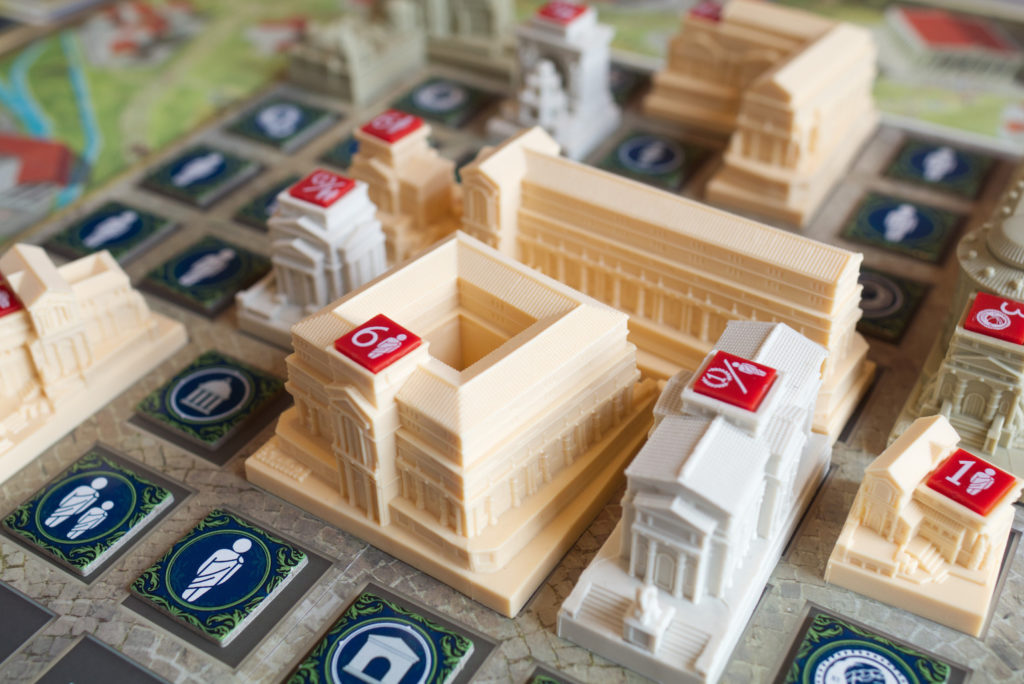
Runner-up: Suburbia was my favourite city builder for a long time due to its compact rules and evocative buildings.
Civilization Game – From Humble Beginnings
I like complex games, but for some reason I’m ending up at the simpler end of the spectrum personally when it comes to civilization games. Call them civ-like or civ-mini games. My favourite is an old game that most people likely will never have heard of called Attika. The goal is to either connect two of the temples on the map or construct all buildings of your civilisation. There is resources to be gained, map tiles to add, a simplified tech tree and instead of combat blocking on the map. You will have to make a choice of rather trying to be fast to occupy land more quickly and connect those temples – or – go for more action efficiency and get those buildings out quicker. Simple but still plays great.
Runner-up: Antiquity is a brilliant mix between city builder and civ-mini game where the fact that each hex can only be harvested once naturally brings player to clash into each other.

Combos – I Do A To Do B To Do …
Question: Who doesn’t like a good combo? Answer: other players waiting for the player to finish their turn! What makes Barcelona great is that it allows for comboing but only to a degree that it doesn’t break the flow of the game. Still, the difference between a novice and an expert player can be 300 points! It’s also not as theme-less as most combotastic Euros, which is a big plus for me.
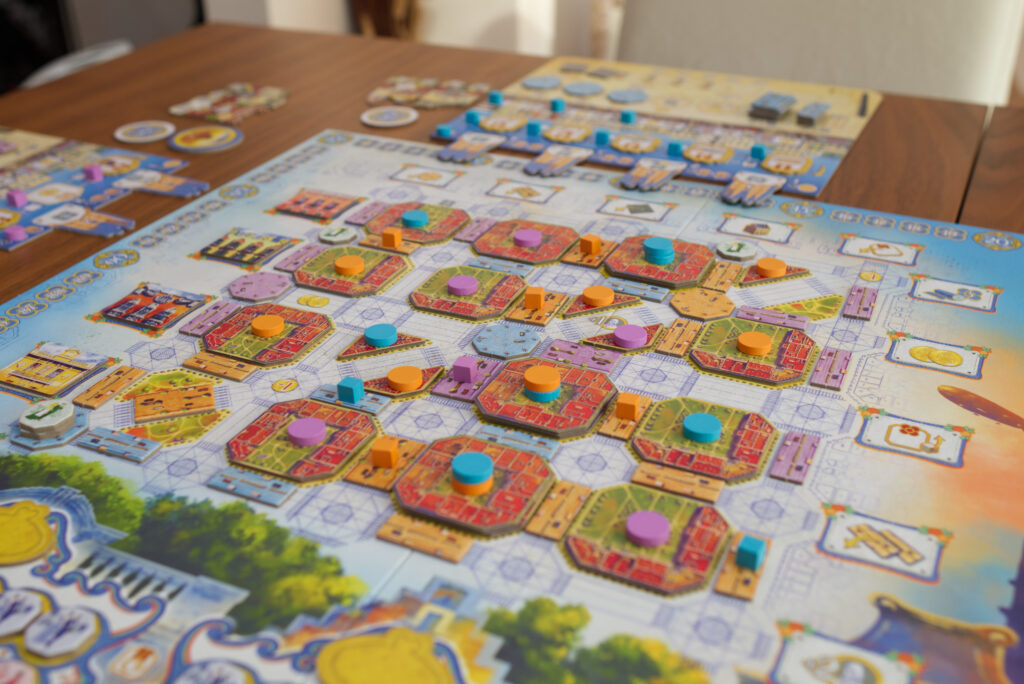
Runner-up: Inventions: Evolution of Ideas takes combo and chaining to the next level. You typically start with one thing you actually want to do and then try to squeeze in more and more indirections on how to do it.

Cooperative – We’re In This Together
Many cooperative games don’t work for me. Either they get stale quickly because every play feels like the previous one or they have a strong alpha-gamer problem where one person makes the plans and others are just there for the execution. I like Burgle Bros 2 because of its crazy theme of casino heist, it’s 10 mission goals which mid-game screw with the rules in glorious ways, and because players actually plan together.
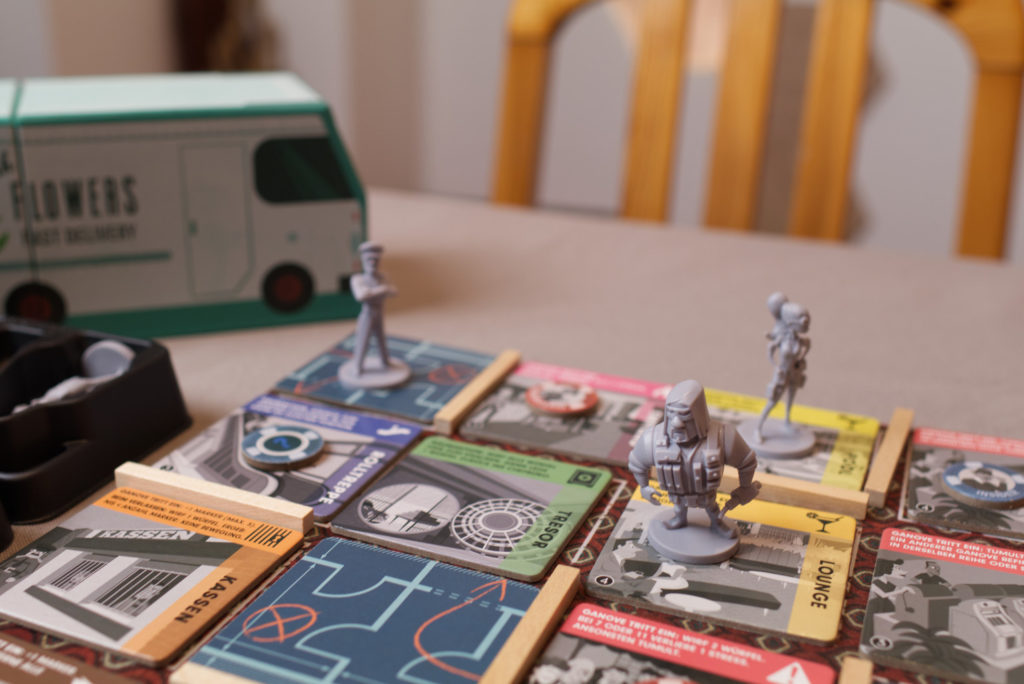
Runner-up: Pandemic Rising Tide, the more gamer-y version of Pandemic where you try to prevent the Netherlands from being flooded.

Dexterity – I Bet You Can’t Do That!
There is only one dexterity game that truly stood the test of time for me, and that is Tokyo Highway. Players extend and branch their roads in an attempt to cross other players’ roads and being the topmost or bottommost road crossing. If so, they can place one of their tiny cars on it and first player to place all wins. The updated version Tokyo Highway: Rainbow City adds rubber pads underneath to make the whole construct at least a bit more stable and thus more strategically but also adds a points mode with various scoring objectives. If you just want to try it out, both are fine. But I strongly recommend purchasing Rainbow City. It also has an excellent (sold separately) solo mode.
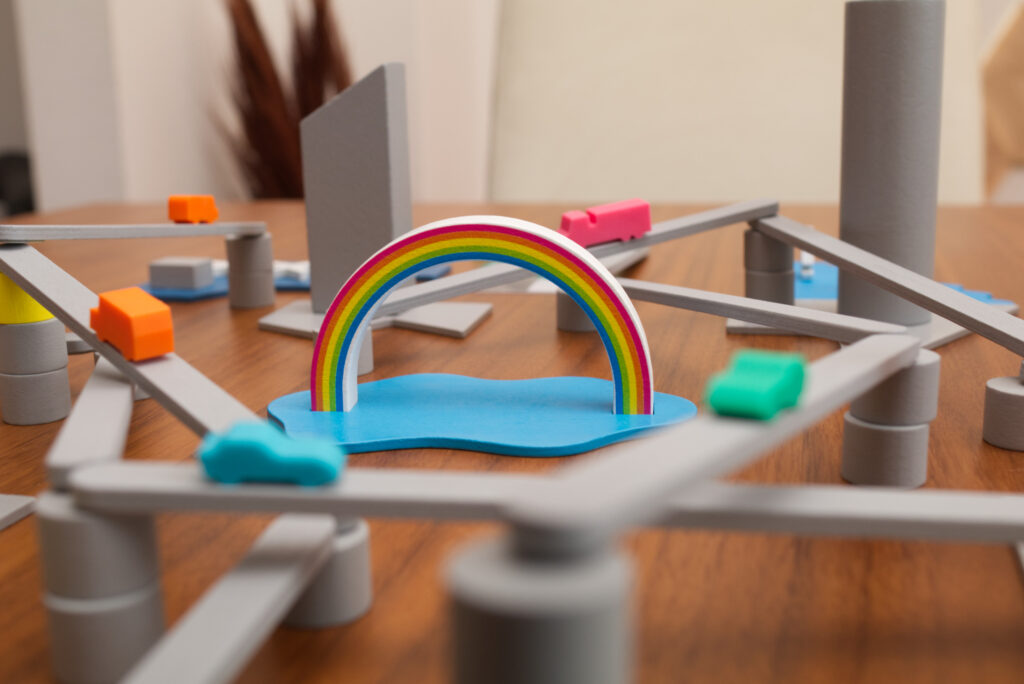
Runner-up: Not strictly dexterity, but Redwood is a beautifully produced pattern-move game about nature photography.
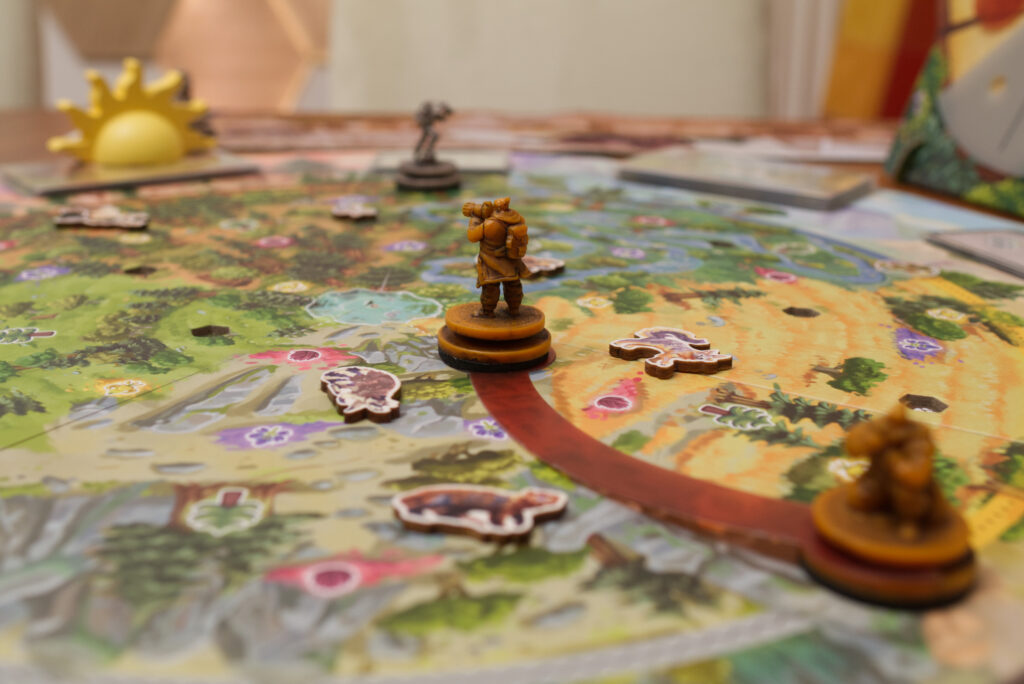
Drafting Game – I Don’t Want This But I Can’t Give It To You Either
I’m not great at drafting games because I always remember too late to memorise what I’m giving other players. But one that I really enjoy is Trailblazers, likely because it is combined with a spatial puzzle. You’ll try to build loops of trails in your park and can watch your co-players’ parks to spot what loops you definitely shouldn’t allow them to complete.
Runner-up: Caper Europe is a heist-movie themed drafting game that is full of charm.
Economic Game – All About The Money
Sometimes you just want to spend money to make money and build something for yourself! Indonesia is currently my favourite one because of its compact rules, high player interaction, and the ever evolving map. The emerging gameplay is complex and rich that every play feels fresh. Players pick up company deeds, either for producers or shipping companies, and then try to grow them and merge them strategically. You might end the game with completely different companies you had in the beginning and can actively sabotage others by manipulating the market. Only downside: Doesn’t really work with less than 3 players and can take quite long (3-4h range).
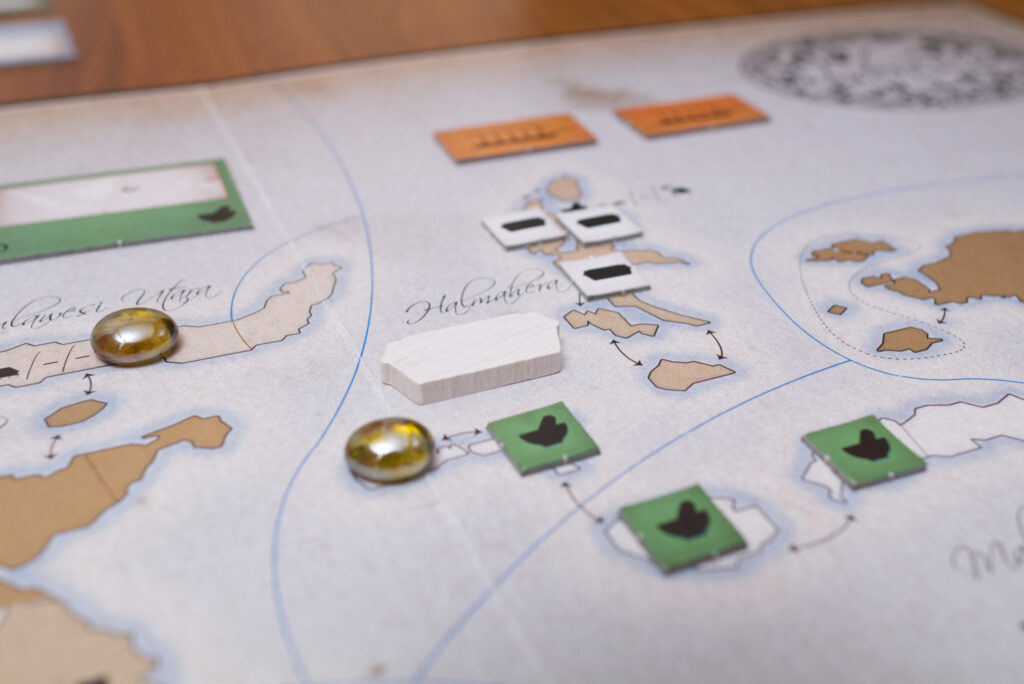
Runner-up: Anno 1800 simply has a great flow to it because you’re buildings tons of industries but never have to juggle resource tokens. The expansion only makes it better!
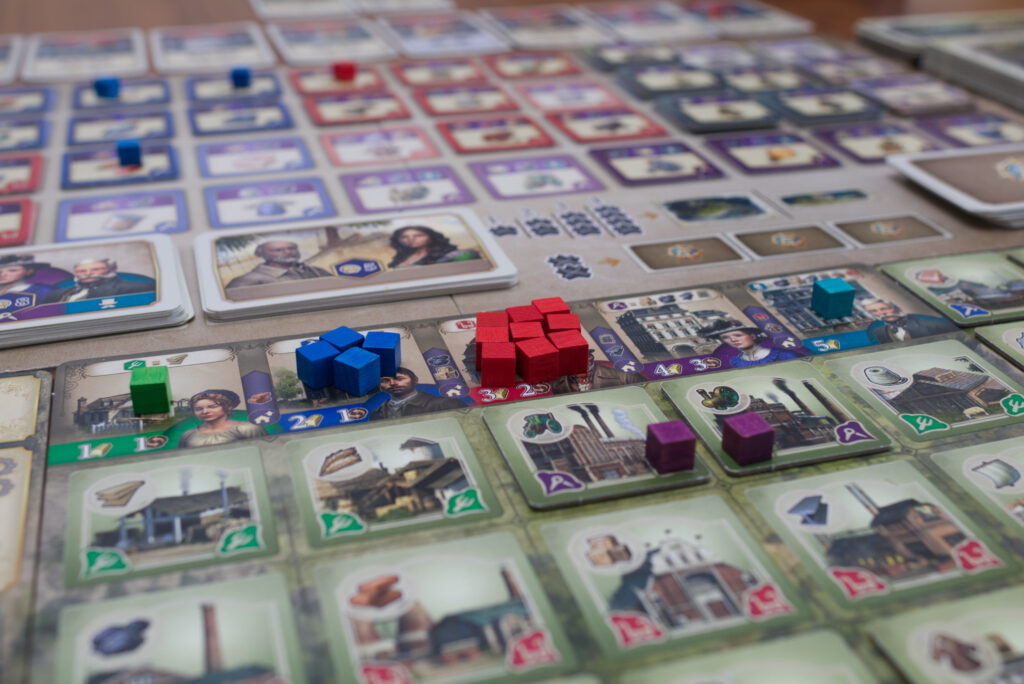
Educational – I Never Thought About That!
I think it’s amazing if a game can inspire you to go out and learn more about a topic. A game that made me pick up two books is John Company 2nd Edition about the history of the East India Company. Each player controls a family that acts within the company to bring themselves to position of power and move money into their own pockets. No single player can act on their own, so heavy negotiations are needed all the time. What is remarkable about the game is that it finds a good balance between illustrating how horrible this moment in time was but also doing it in a way that beats player over the head with it. It’s more that you’ll adapt an attitude of “of course I have to send military there, I need more money for my shiny house” which opens up whole rabbit holes of thinking.
Many downside to this game: 40+ rules, long play time, and so for many this is more an event game to play once or twice. It however also has a really good solo mode which is how I play it most of the time.
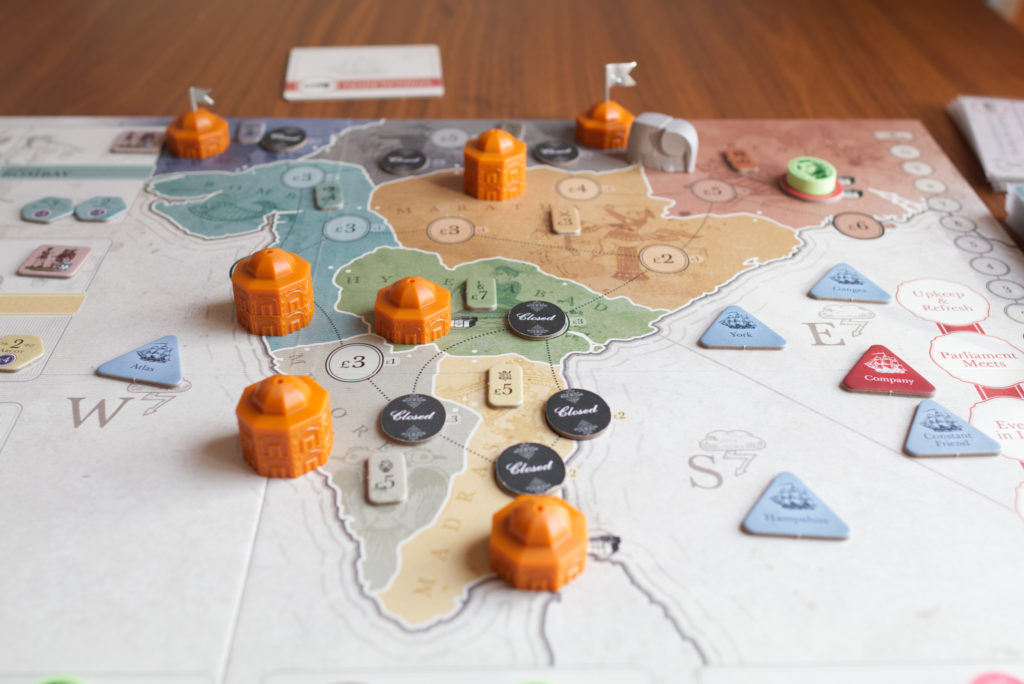
Runner-up: Hegemony, a game about acting as different classes in society and influencing politics.
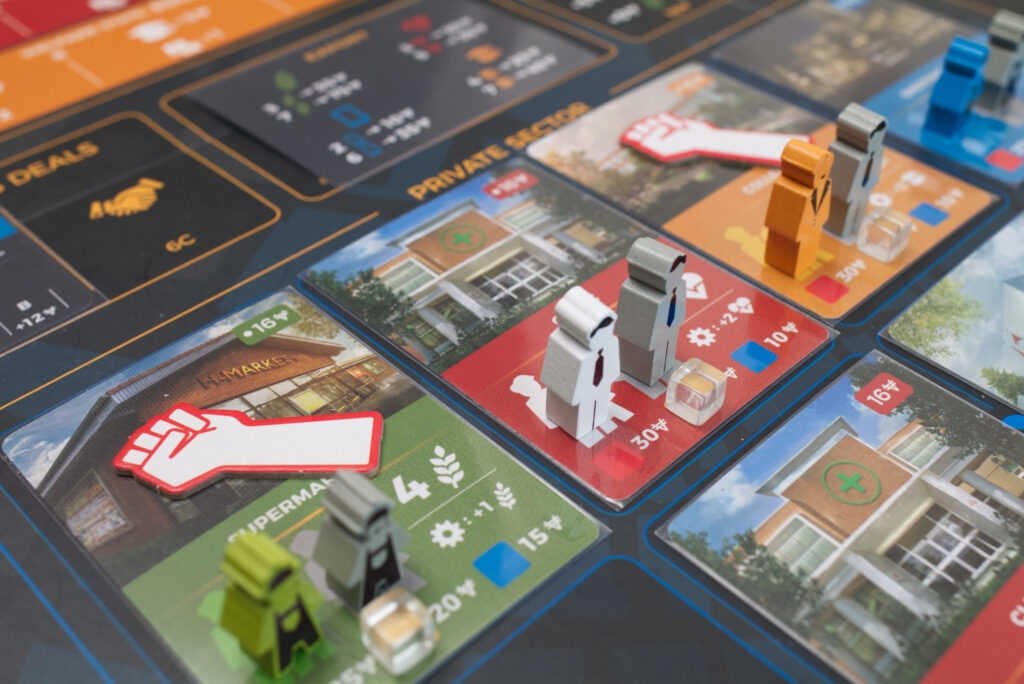
Epic – If I Have All Day …
In the rare case where it’s a rainy day and play time for once really doesn’t matter, I’d go for The Colonists. You start with a small map of basic production & refinement hexes (chop wood, turn wood into boards, play a card, …) that grows and grows with new functionality over time. Each player also has their own village where they can build various buildings with the most important aspect being that you have limited storage for resources and always need to figure out what exactly to produce when.
Initially, it feels a bit like Agricola combined with positional blocking on the map, but the real kicker is that The Colonists can be play in up to 4 eras. Each comes with its own set of buildings and map tiles, forming an ever more complex economy. Where in the first era players can do pretty much everything just with wood, in later eras you’ll have casinos, metal production, and the likes.
It can be played in 2-3h with a single era and one can start at a later era, but doing multiple ones from the start of course produces the real epic feeling. Biggest downside (besides play time) is that it is rather multiplayer solitaire except for the blocking on the map.
Runner-up: Sleeping Gods, a story book driven exploration game.
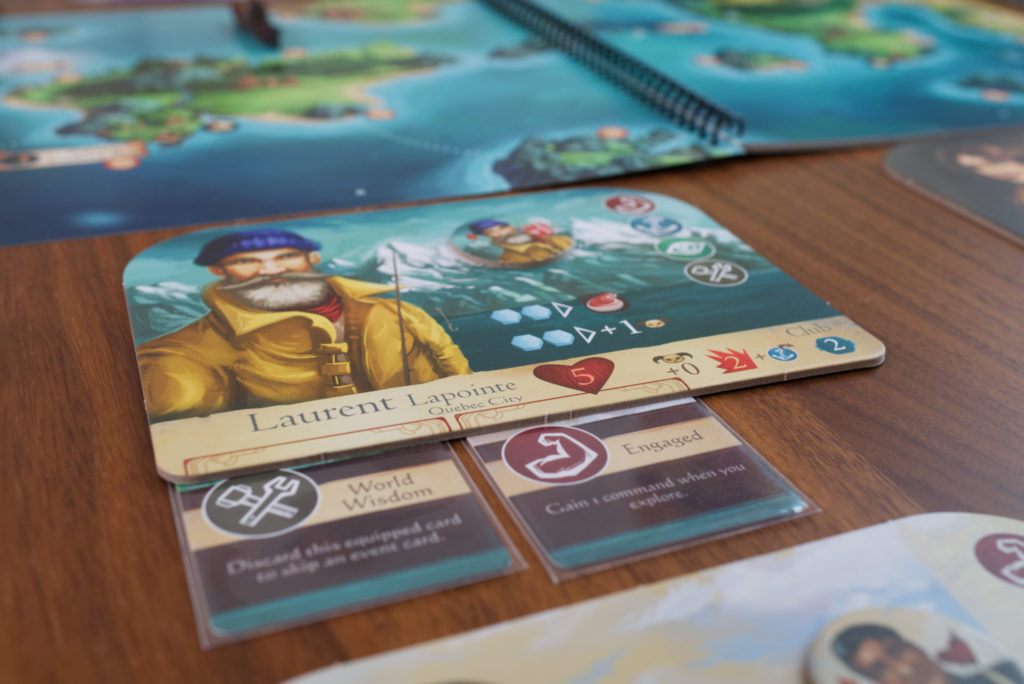
Interactive Euro – Are We Playing Together or What?
Many Euro games have only very indirect interaction/competition and can feel like multiplayer solitaire. One game that is the polar opposite of it is Carnegie, a game about action efficiency, building your network of industries throughout the US and having to do donations to convert it into actual victory points. Few games have made me check my opponents’ boards as frequently and intensely as this game, always being on the edge of my seat when another player would pick the action we’d be all doing for that turn. Compact rules, great production and an excellent solo mode make this a great overall package.
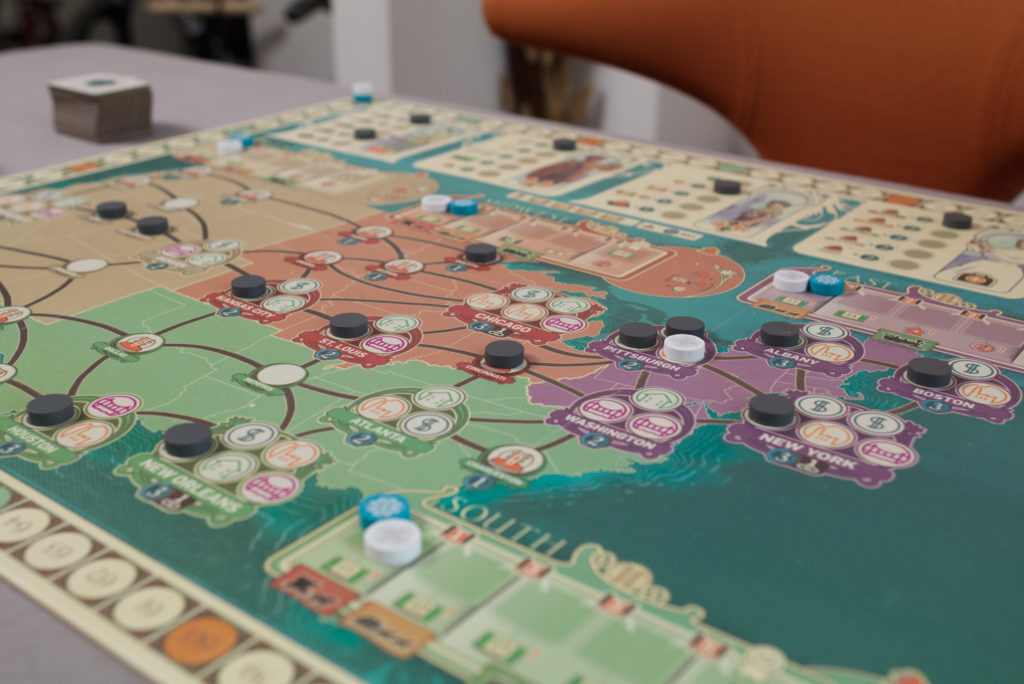
Runner-up: Bus is a route building game that’s all about interaction. In fact, it’s the right game if you want to learn hating everyone around the table, including yourself.
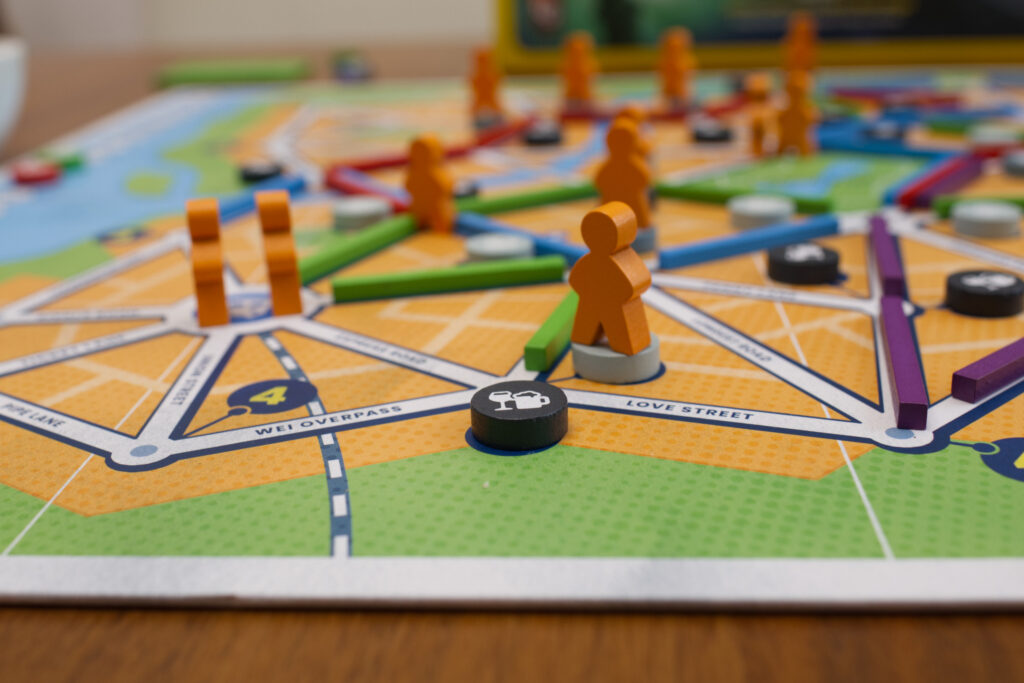
Racing Game – First Over The Line Wins
One of the games I have introduced the most new players to is Heat: Pedal to the Metal, simply because it is so engaging. Effectively it is all about hand management because heat (the currency of the game) keeps sneaking into your hand and you have to find the right time to get rid of it again. Every time you make a daring manoeuvre like racing through a corner too fast or shifting too aggressively, you get a heat in your deck and once you draw it, it’s stuck on your hand. You can’t discard it or play it, you can just shift down, let your car cool, and that way get it back into your supply.
The base game of Heat already comes with a lot in the box: four different maps, up to 6 players, excellent solo mode, a campaign mode, tiles to change the making of the existing tracks, etc.
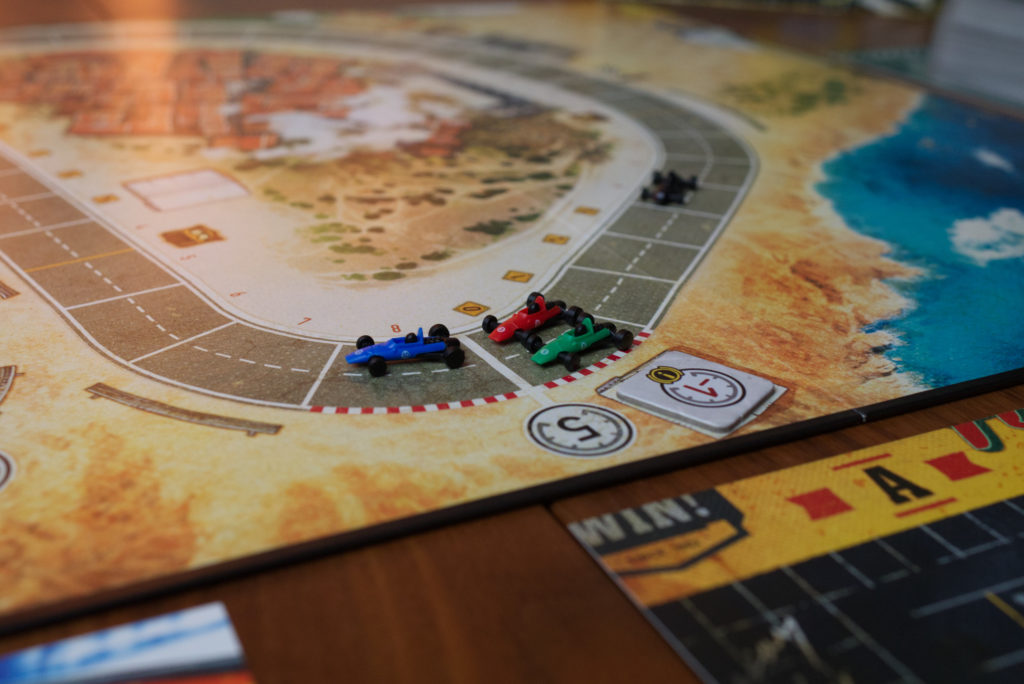
Runner-up: Robo Rally is a crazy turn-programming game where players race through a running factory and shoot each other.
Solo Mode – When Your Friends Don’t Have Time
Fortunately, by now most games come with a solo mode and while not all are great, there are a lot of good ones out there. My favourite non-solo game to play solo is Horseless Carriage because I like the spatial puzzle and how I still have the feeling I have no real clue what I’m doing. Don’t get me wrong, I know the game and I have some strategies, but the puzzle is so complex it always feels fresh.
In Horseless Carriage, players manufacture automobiles at a time where cars are still a new concept and buyers don’t necessarily know what they want. The crazy part about this is that the only real currency in the game is the space in your factory. You can put as much stuff in there as you want, if you can only make it fit somehow. Then there is a whole layer of market manipulation on top of it and a layer of pushing different research on top of that. Horseless Carriage is a love/hate type of game and I’m deeply in love with it! Note: there is no official solo mode but the one I created myself has become quite popular.
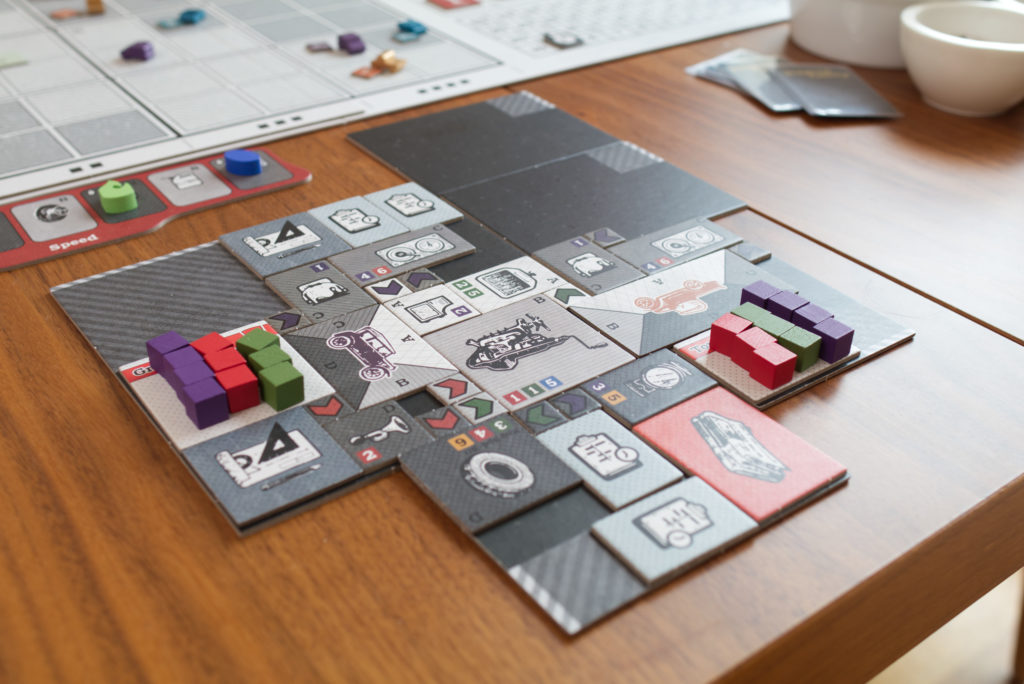
Runner-up: Too many good choices, see my recommendation lists from 2023 and 2024.
Solo-Only – Me, Myself, And I
I’m publishing annual recommendation lists for solo games, so I’ll refer you to the ones for 2023 and 2024. If I have to pick one that is 1p only, I’d recommend Kingdom Legacy. It’s a game consisting solely of 140 cards and a few stickers. You start with a tiny deck of ten cards and by spending and rotating cards, you’ll upgrade your kingdom (=deck) to more powerful cards. Once you went through your deck, you add two more cards from the supply and that tells a (abstract, vague) story of your kingdom evolving. Suddenly enemies come into your deck and you’ll need to create knights, you’ll get to explore new lands, and so on. It’s originally intended as a one-time-play experience but can easily be replayed by using some stickers or sleeves. There is also now a big 160 card expansion that tells the story of building boats and sailing to new shores.
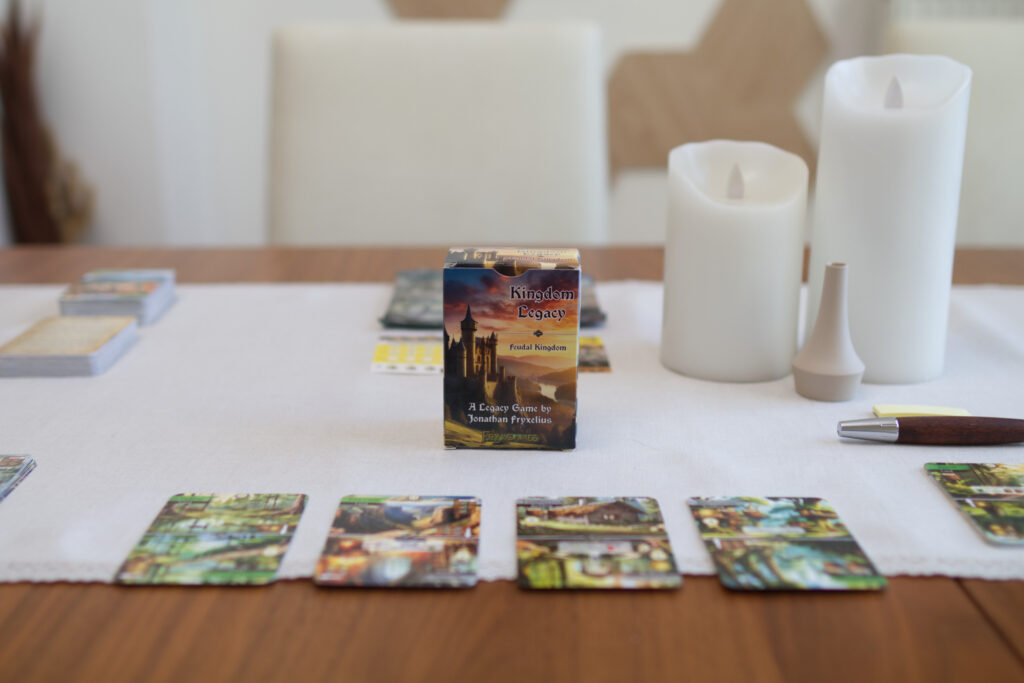
Runner-up: I haven’t played that many games that are one-player-only. Another I enjoyed is I, Napoleon, in which you play through the life of Napoleon Bonaparte.

Spatial Puzzle – What If I Rotate This and …
I really like spatial puzzles, so naturally I gravitate to the one that makes your brain hurt if you try to think it through: Horseless Carriage. The only real currency in this game is the space you still have left on your factory floor and you have to make the most of it: what type of cars to produce? Which features to build in? How much to invest in R&D? It’s a clever game about pushing demand in a direction that three turns later you still can satisfy it and others suddenly notice their factory just doesn’t have any space left to put in the required features. Brilliant design, but most people unfortunately bounce right off it, either because they don’t like spatial puzzles or the game is too fiddly for them.
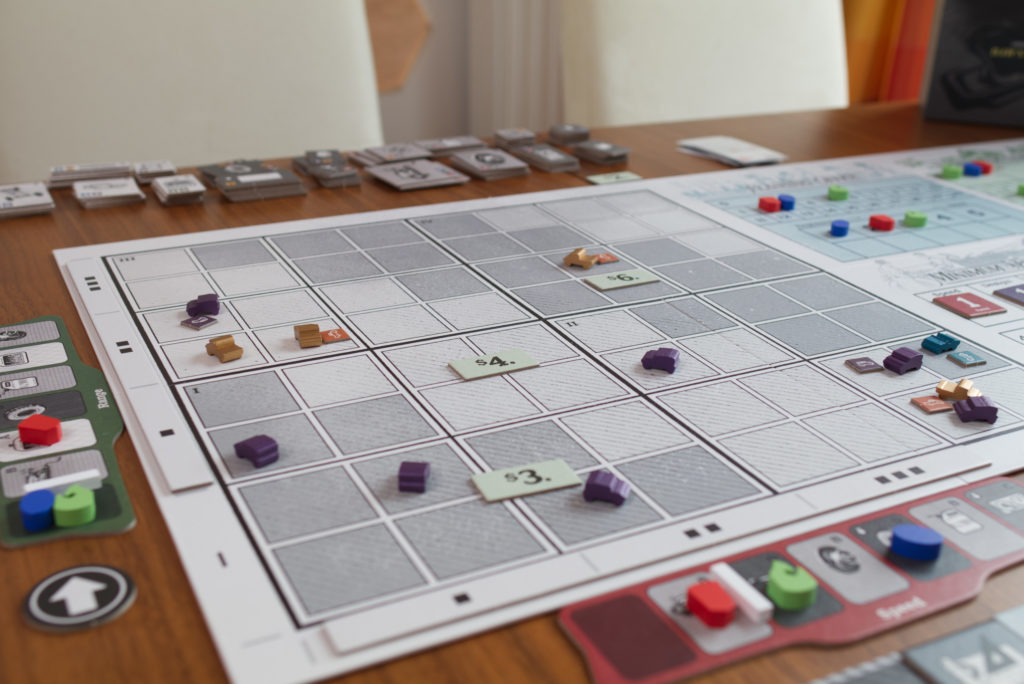
Runner-up: As a more “standard” spatial puzzle game, I enjoy Fit to Print, a game about creating a newspaper under time pressure.
Story-Driven – Read It To Me!
My favourite in this category is still the original Sleeping Gods, simply because of the great sense of exploring and the witty humour that shines through all the time. I’m not even sure anymore how many campaigns I have played already, likely 8 or 9, and there still seem to be corners of this world I haven’t investigated yet. It’s basically a choose-your-own-adventure book on steroids.
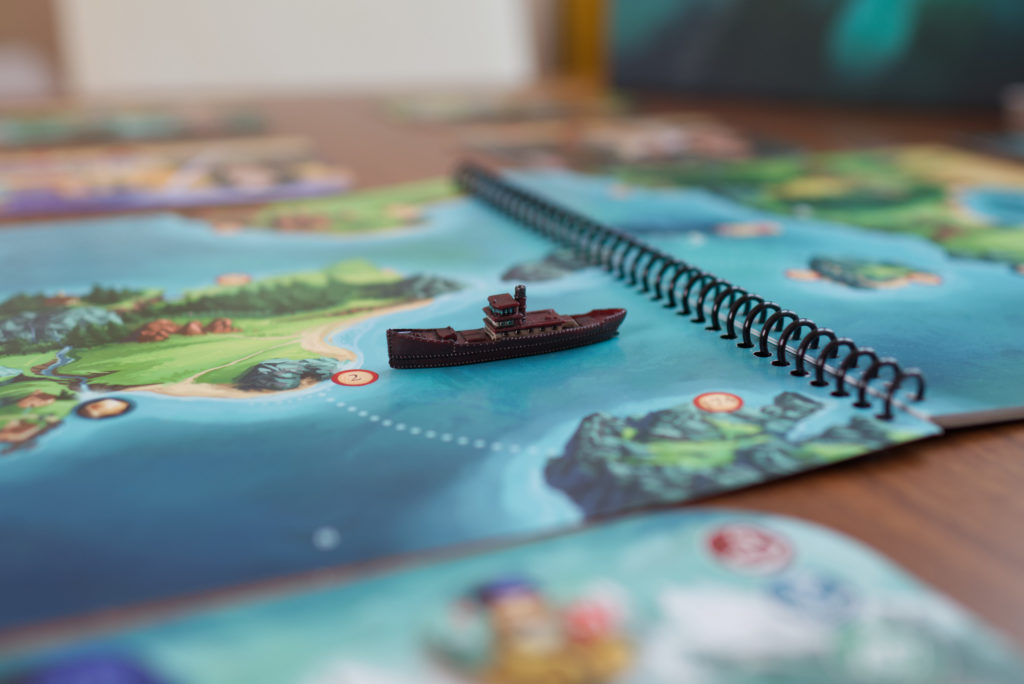
Runner-up: I really enjoy the story elements in Near & Far and often wish the game would allow me to read more of them.
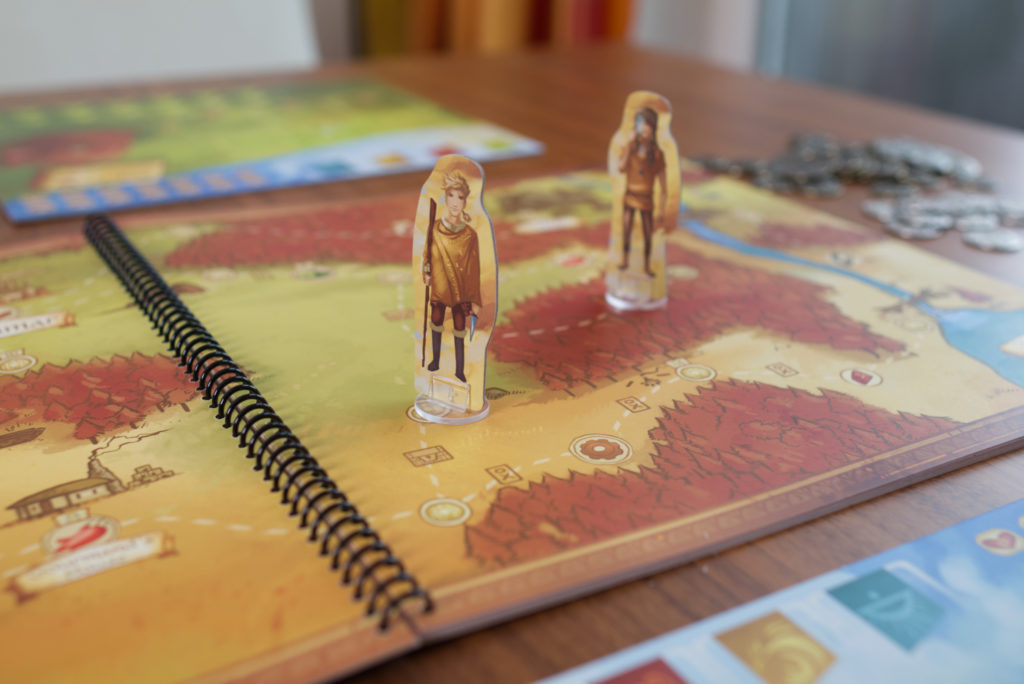
Tight Actions – One More Round Please
The theme of Austrian coffee house culture in Grand Austria Hotel gives it a deceptively cozy look, but it is definitely for the heavy gamer. You’ll pick up guests, lure them in your cafe and once you were able to fed them with strudel, wine, or coffee they are willing to stay the night. There are only 7 rounds and each round a set of D6 is rolled to figure out which actions are available that round and how strong they are. E.g. if there isn’t a single 1, you won’t be able to get food that round, if there are five of them, the first person to do that action will get five food with one action. Once one player has done their action, they remove that die and so actions become less powerful as the turn progresses.
In the end you only have 14 actions (7 rounds with two actions each) to satisfy gets and get your rooms occupied. So there is tons of comboing, hiring personal to make your actions more powerful, and so on. There is also a good mixture of competition (by taking away certain dice or guests) and do-your-own-thing, but it can be pretty AP-prone and therefore is recommended more for 2-3 player.
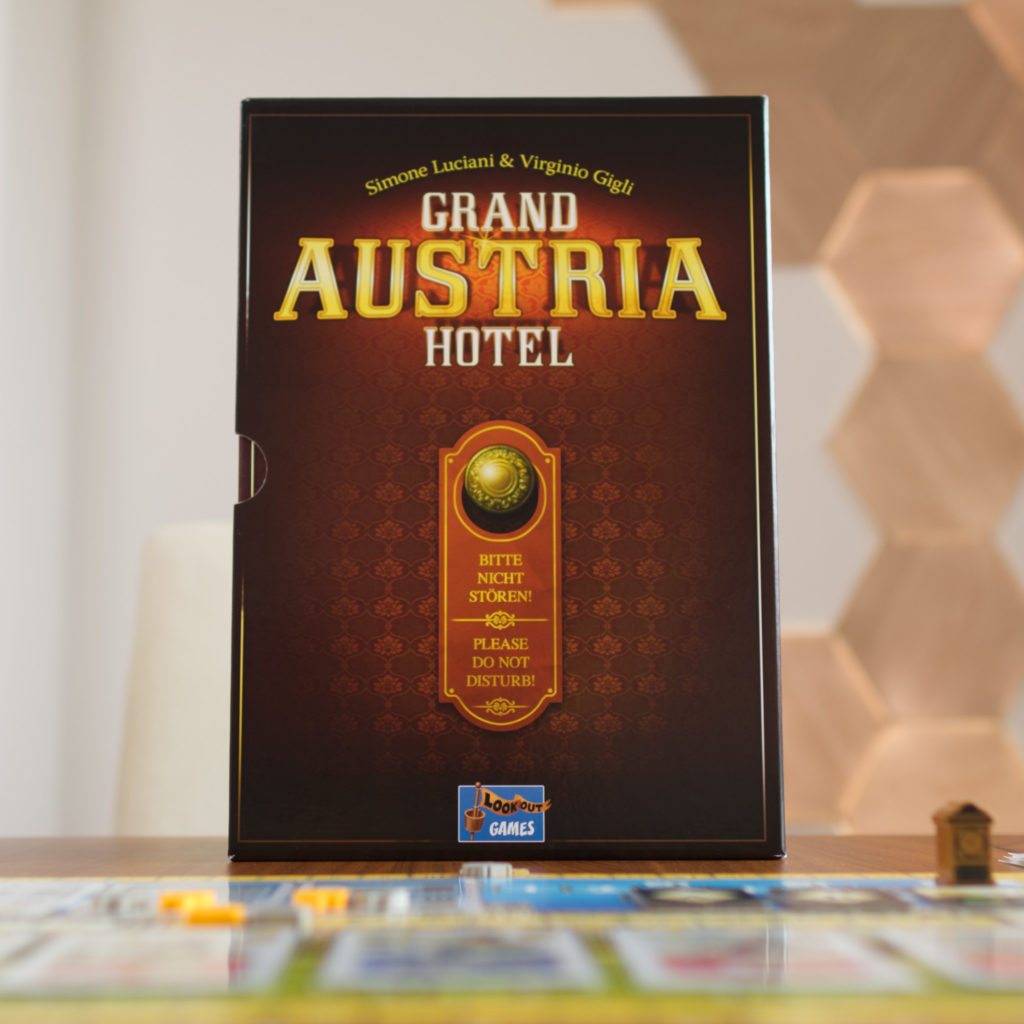
Runner-up: Evacuation, see Tight Economy.
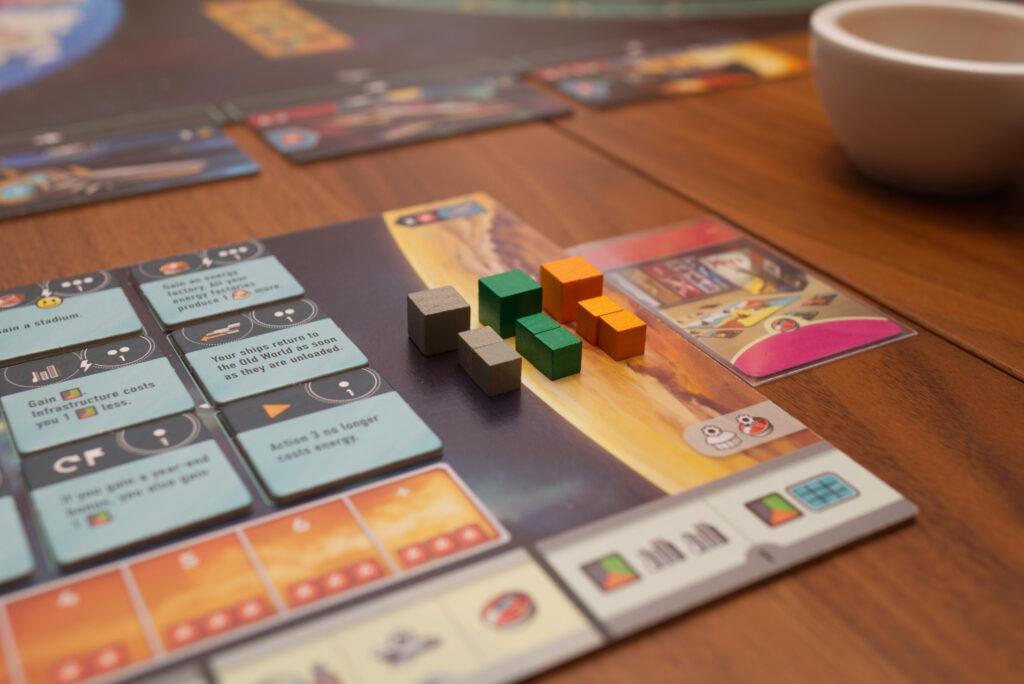
Tight Economy – Why Am I Always Missing One …?
I’ve rarely seen a game where missing a single resource cube can have such devastating effects as in Evacuation. Players are relocating from one planet to another and basically have to shoot themselves in the foot by first tearing down their existing economy they received during setup. If you do it quicker, you gain speed but loose income. If you do it slower, you have more income but might miss prime spots on the new world. The whole game is only 4 rounds, further increasing the pressure.
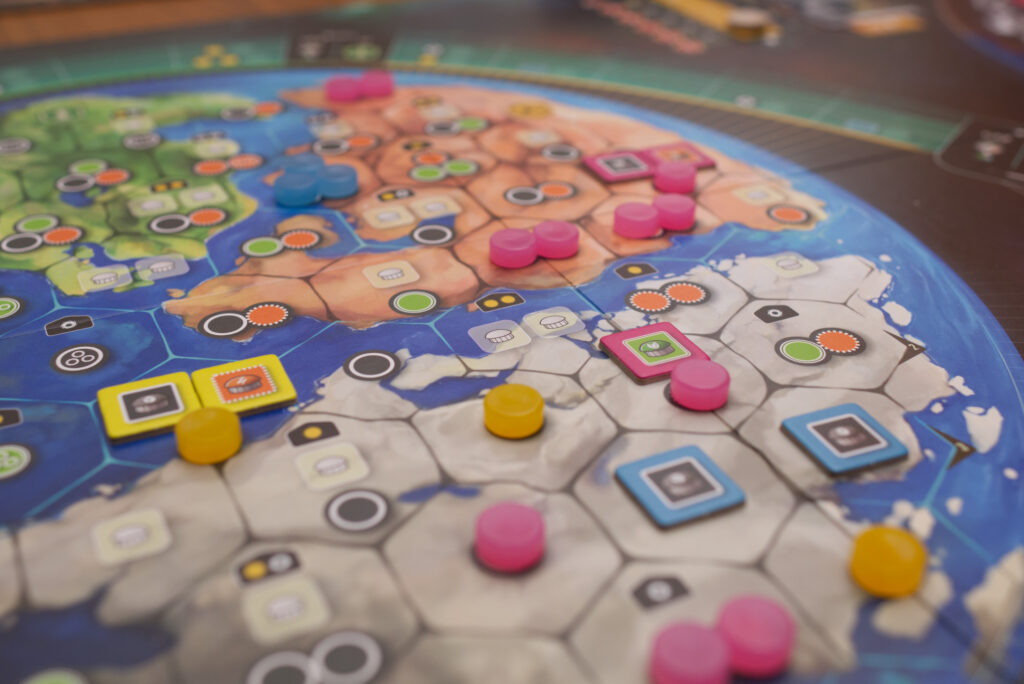
Runner-up: Antiquity, a sort of mini-civ / city building game where your workers that harvest resources are locked in for multiple rounds and you usually can’t store anything for the next round.

Tight Points – You Win With a Score of … 5?
Many games shower players with lots and lots of points. 5 points here, 50 points there, get some bonus points while you’re at it. There are however games where every single point counts and it’s a question of when do you put all your energy into something or rather wait for later.
My favourite in this category is Dune Imperium, a deck building meets worker placement game set in the Dune universe. Each card has three different functions: it limits to which worker placement fields you can go with that card, it has it’s own function when used to place a worker, and it has a different function when not played but revealed as remaining card at the end of the round. The latter usually comes in the form of persuasion points that can be used to buy new, more powerful cards. You need to evolve your deck so you stay flexible in where you can go with your workers (instead of ending up with a hand full of cards that all limit you to just one region) but also get good synergies from the cards. There are factions you can gain reputation with, asymmetric player powers, game breaking one-time-use intrigue cards, and a (very abstracted) battle at the end of each round.
All of this comes with surprisingly few rules and is rather streamlined. But the most amazing thing is how balanced the game is. In a game where 10 VP triggers the end, we usually end up with most of the players groaning a “if I would just have X, I would have won!”. Plays well solo as well! Note: the nice minis shown in the picture are sold separately, but it plays totally fine without them.
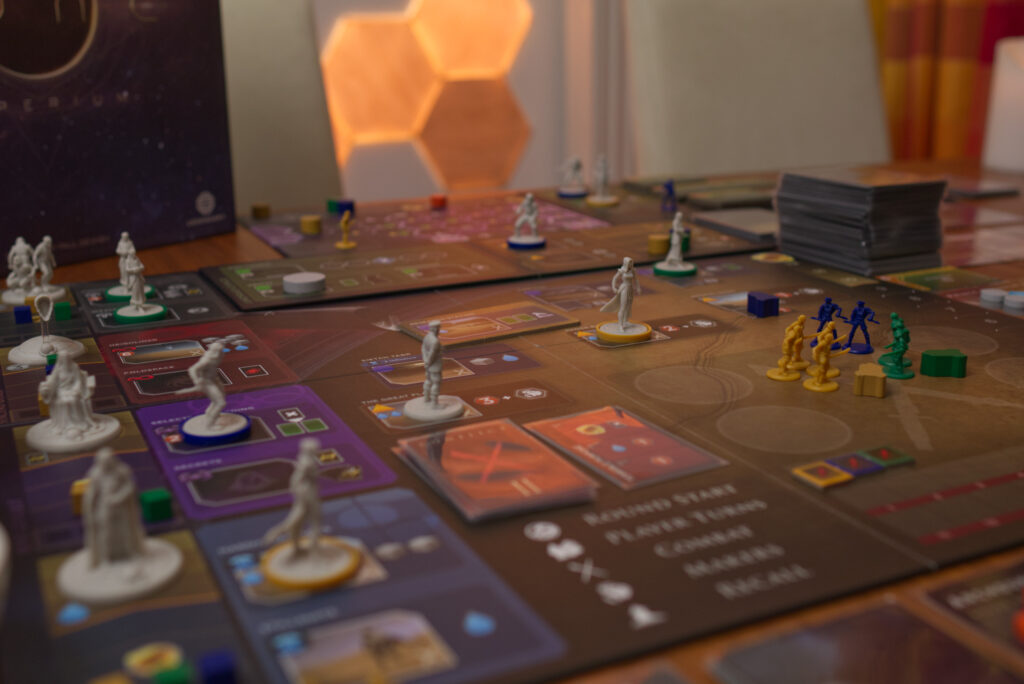
Runner-up: Bus, a game that looks like a simple route building game but turns out to be a knife fight in a phone booth … oh yeah, there is also a time machine involved!
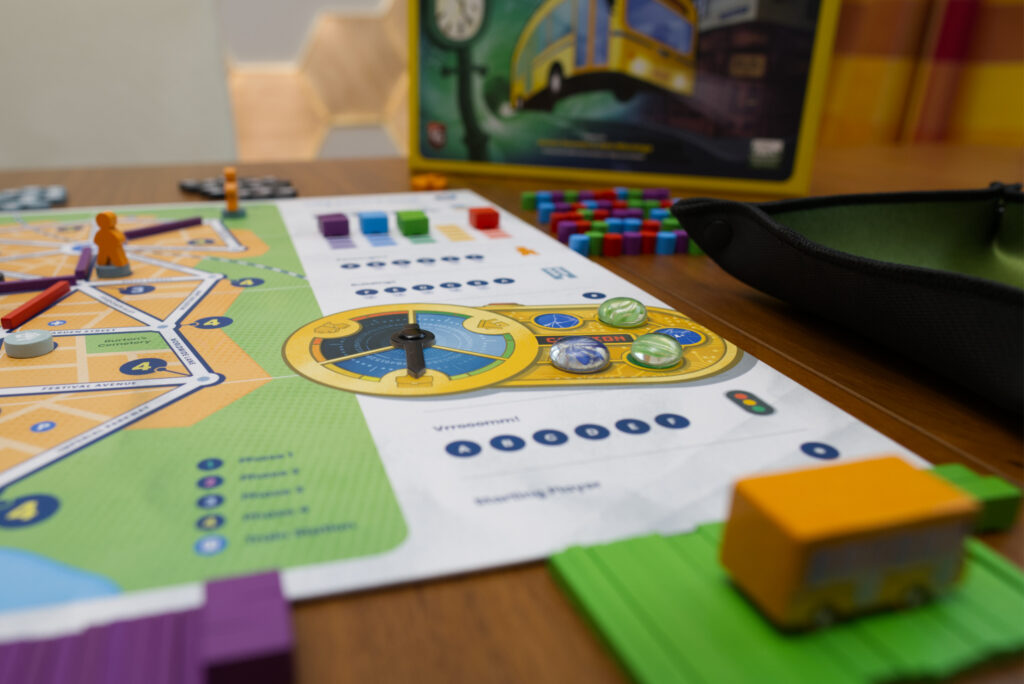
Train Game – Choo Choo, Baby!
I’m not much of a train gamer and while I enjoy Brass Lancashire / Birmingham or Age of Steam, I usually go less to the heavy end of the spectrum but the more fun one. My recommendation here would be Maglev Metro, a game that looks like something children would play with but is rather tight and mean. Players use transparent hex tiles to build their route and pick up robots (which can be used to make their actions more efficient) and passengers (that unlock new lines and actions). Each turn is rather snappy, giving the game almost a real time feel of trains zipping over the map. It’s not your typical train game where the goal is to make money but rather a race for efficiency in actions and VP.
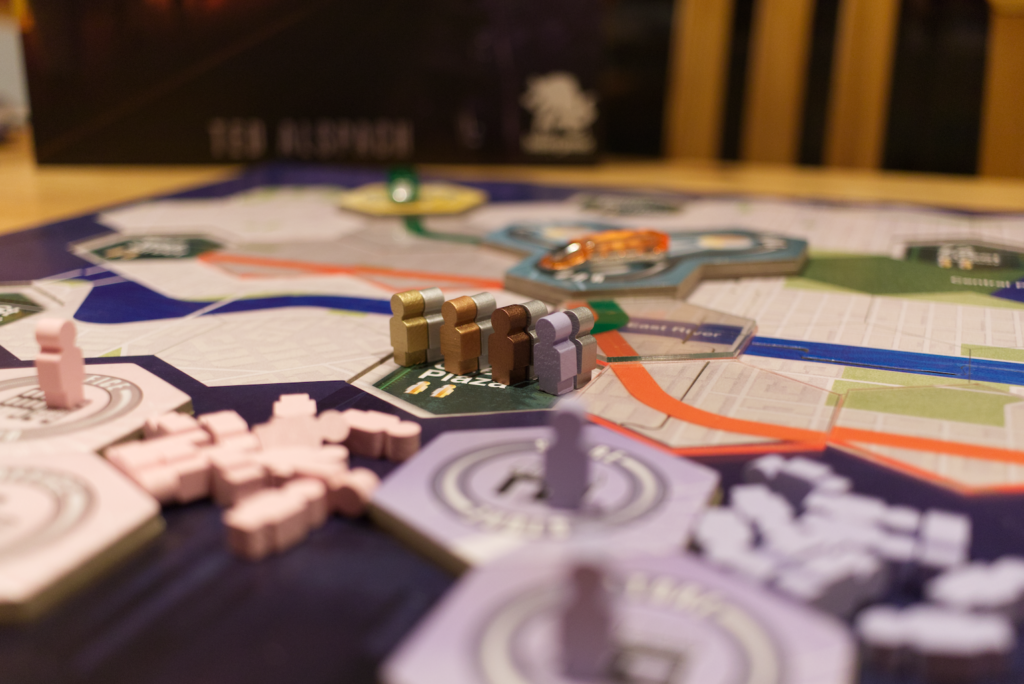
Runner-up: I always felt Trans America is an under-appreciated gem where players all build on the same network but try to use what others instead of having to waste turns themselves.
Two Player Cozy – Honey, I’ll Make The Tea
My battered copy of Lost Cities the card game tells stories of how much I have played this since it came out back in 1999. It’s still my favourite “let’s make a big pot of tea and play all evening” 2p game. The premise is very simple: five expeditions (=sets of cards) ranging from 2 to 10 plus three “hand” cards are shuffled together and each player gets a hand of 8. You try to put ascending lines of same colour cards in front of you with each card being worth as many points as its value indicates. The kicker: starting to play cards in a new colour adds a -20 VP penalty and the hand cards can give a 2x-4x bonus.
The meat of the game lies in hand management. Every turn, you play a card and draw a card. You can draw from either the deck or one of the discard piles and you play a card to one of your lines of cards or put it on one of the discards. The problem: you can’t play everything (due to the -20VP offset) but you don’t want to discard them either because your opponent might need them. So you constantly juggle which cards to play, which to discard, and which to clutter your hand as you desperately don’t want to do neither of the other options. Simple, brilliant, can always play.
Runner-up: Right now, I enjoy Caper Europe a lot. It’s a drafting game themed as a heist movie.
Two Player Competitive – Let’s Get The Knives Out
It’s not strictly 2p-only, but when I think about playing a competitive, heavy game with a friend, I often end up at Grand Austria Hotel (see Tight Actions for more).
Runner-up: Curious Cargo, a spatial puzzle tug of war.
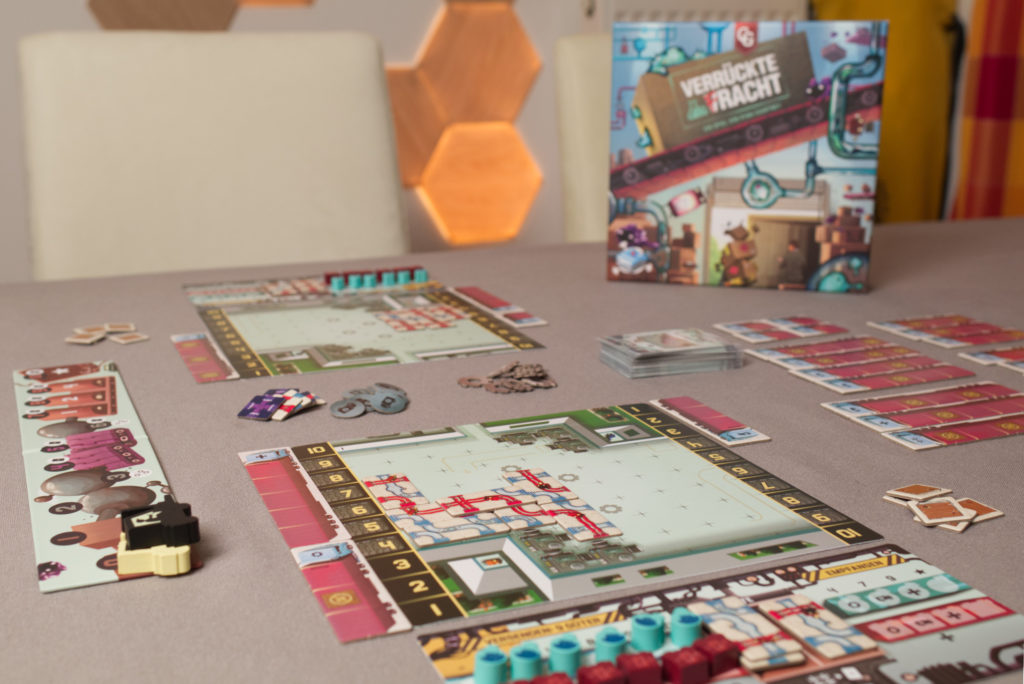
War/Conflict Game – Let’s See How Strong Your Troops are!
My friends can attest to me feeling really uncomfortable when it comes to direct aggression in games. The only times I seem to enjoy it is if it’s the sole focus of a game and therefore inevitable. My favourite in this category is still Shogun (the reimplementation of Wallenstein) which I usually pitch as “what Risk should have been”. It features the excellent cube tower for a dynamic but simple combat system, you have to feed your regions which prevents one player from simply spreading everywhere, and you actually make more points with upgraded regions than by having many of them, allowing players to turtle a bit if they want to.
Runner-up: So far, I don’t enjoy Roads & Boats multiplayer because it’s mean, mean as heck, and I’m not good at that. But you have to acknowledge how brilliant this game is and I come to enjoy it more and more solo as a logistics puzzle.
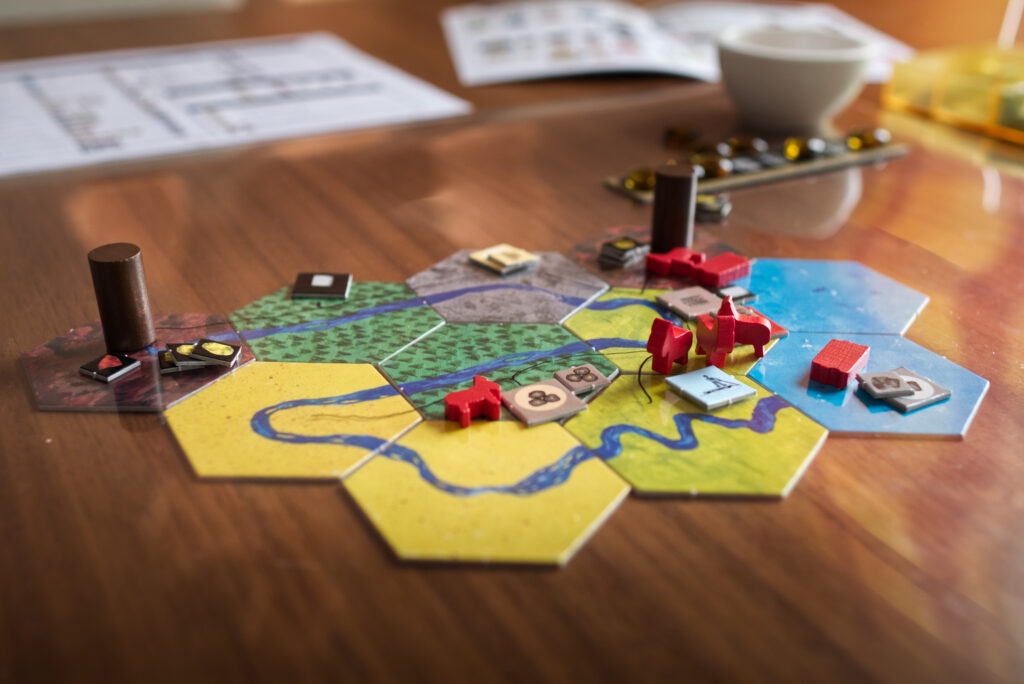
Word Game – Wait, Wait, I got it!
Landmarks isn’t a word game in the sense of Scrabble, but one player uses a single word to give clues to the other players while exploring an island for hidden treasures. This has a feel similar to Codenames, but less of the paralysis effect. Works well in team-vs-team mode as well.

Runner-up: Paperback, a scrabble like word building game with cards that have special effects.